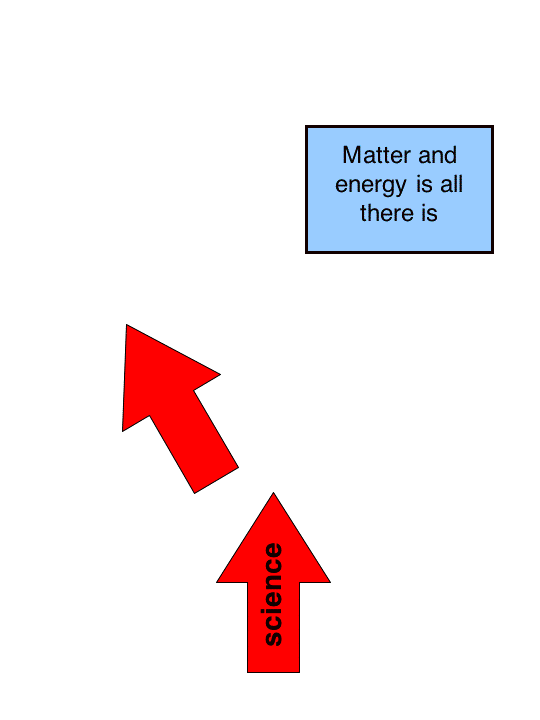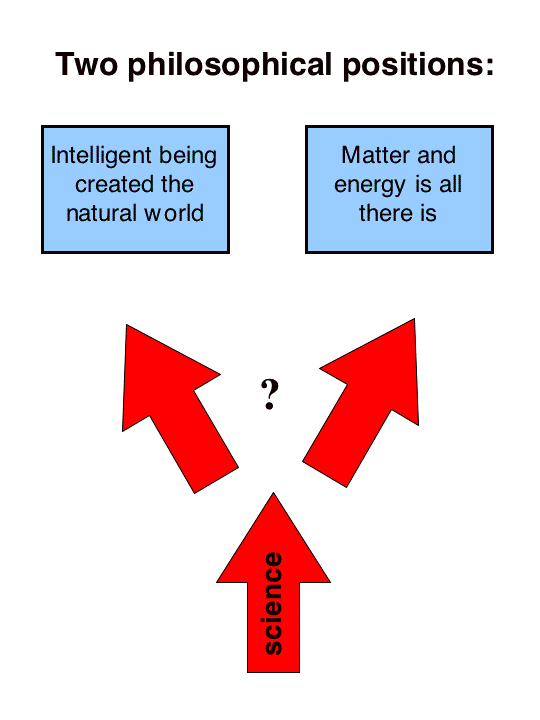
Design
II. Two ways of viewing this debate
1. Science is a methodology, a way of learning about the natural world. It is distinct from philosophical views of reality, such as naturalism or theism.
Within this view it is logical and appropriate to ask whether the results of scientific inquiry lend more support to one view of reality or the other. One way to make this assessment is to decide whether natural processes provide a complete description of the origin and operation of all aspects of our existence (objective reality).

Design
The origin of certain aspects of our existence lies beyond nature, the existence of a Designer is objectively detectable in the natural world.
Materialism / Naturalism
All aspects of our existence (including origins) are explainable by invoking only matter, energy, and natural law.
"The basic idea of The Blind Watchmaker is that we don't need to postulate a designer in order to understand life, or anything else in the universe."
R. Dawkins, The Blind Watchmaker, Pg 147.
No intervening spirit watches lovingly over the affairs of nature (though Newton's clock-winding god might have set up the machinery at the beginning of time and then let it run). No vital forces propel evolutionary change. And whatever we think of God, his existence is not manifest in the products of nature.S. J. Gould, In Praise of Darwin, in Darwin's Legacy, p. 6-7.
"... universe devoid of intrinsic meaning for our lives"S. J. Gould, The Panda's Thumb, pg 83.
"The cosmos is all that is or ever was or ever will be"C. Sagan, Cosmos
"We are the product of 4.5 billion years of fortuitous, slow biological evolution"C. Sagan, The Cosmic Connection, pg 4.
"...man is the result of a purposeless and natural process that did not have him in mind."G.G. Simpson The Meaning of Evolution, p 344.
"Man is the result of a materialistic process having no purpose or intent; he represents the highest fortuitous organizational form of matter and energy."G.G. Simpson quoted by W. Gitt, "In the Beginning Was Information", p 78.
Some shrink from the conclusion that the human species was not designed, has no purpose, and is the product of mere mechanical mechanisms - but this seems to be the message of evolution.D. Futuyma, Science on Trial, pg 13.
"...biology provides no evidence for omnipotence, intelligence, purpose, or design."
D. Futuyma, Science on Trial, pg 14.
"Naturalism assumes the entire realm of nature to be a closed system of material causes and effects, which cannot be influenced by anything from "outside". Naturalism does not explicitly deny the mere existence of God, but it does deny that a supernatural being could in any way influence natural events, such as evolution, or communicate with natural creatures like ourselves. Scientific Naturalism makes the same point by starting with the assumption that science, which studies only the natural, is our only reliable path to knowledge."
P. Johnson, Darwin on Trial, pg. 116, 117.
In this view, the worldviews of naturalism and design (theism) are distinct from the practice of science. The philosophical presuppositions necessary to do science are compatible with either worldview. In addition, in this view everyone is on the side of science. The question is, to which worldview do the data of science point?
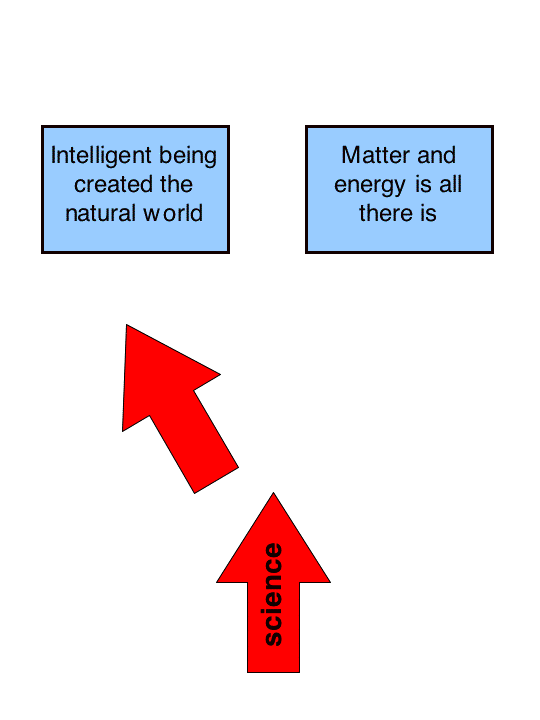
2. This view lumps science and naturalism together, and equates both with rationality.
This view presupposes that the mechanisms of all aspects of our existence, including origins, must be purely naturalistic. Any deviation from this position is viewed as irrational. This leads some to equate naturalism with reality and denote all belief in something outside nature as fantasy. Some naturalists allow that an intelligence outside nature may exist in principle, but insist that one can't detect evidence of such an intelligence within the natural world. Another expression of this view is that belief in an intelligence outside nature does not conflict with science because they are separate domains that do not overlap (non-overlapping magisteria - NOMA). The domain of science is objective reality, and the other domain is ...?
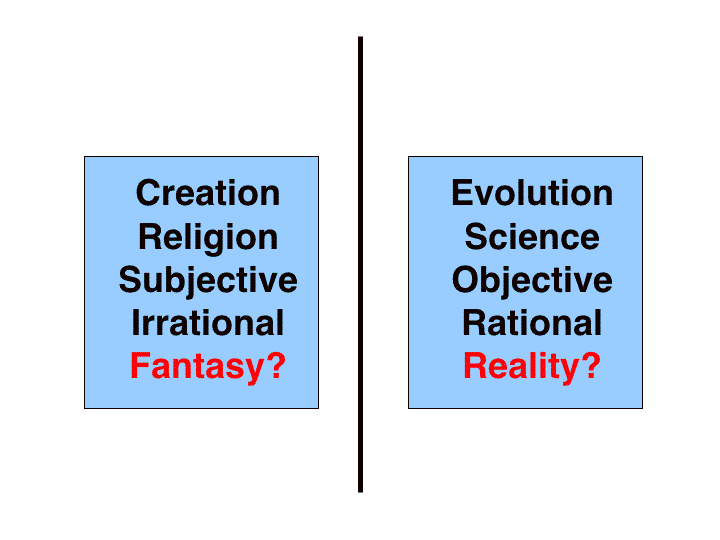
In this view, science (and objective reality) can only support naturalism.
Gould writes that religion and science should not conflict "because science treats factual reality, while religion struggles with human morality".If the domain of science is objective reality, and religion is deemed outside of that domain, then it is a short step to conclude that the domain of religion is fantasy.S. Gould, Scientific Amer. July 1992."The proper field of concern of their religion should be morality and spirituality, not the nature, origin, and history of the universe. These matters belong to science."
N. Newell, Creation and Evolution pg 21.
naturalism = science (objective, rational) design = religion (subjective, irrational)
"How does it happen that so many people with a comparatively high level of education are today unable to distinguish between fantasy and reality?"N. Newell, Creation and Evolution pg 21."It is not surprising that people who prefer emotional stimulation to analytical thought frequently turn to hallucinogens, mysticism, and religious cults - psychological crutches that replace self-discipline, responsibility, and rational doubt. The current exaggerated interest in astrology, the occult, monsters, creationism, and visitors from outer space is a mass renunciation of mature reason, since these topics are deficient in both theory and evidence."
N. Newell, Creation and Evolution pg 23.
Science cannot point to design, even in principle, because that is not considered to be a rational possibility:
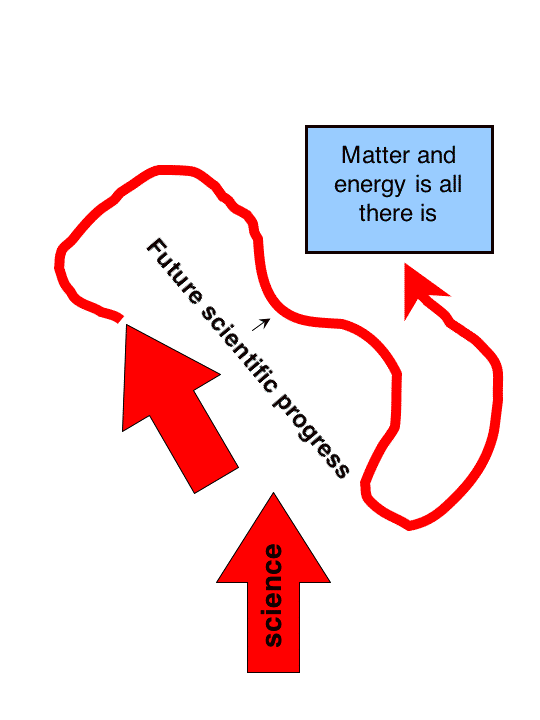
In this view, the debate is characterized as science versus religion.
Methodological naturalism and metaphysical naturalism:
The two ways of viewing this debate illustrated above hinge upon the acceptance or rejection of the principles of methodological/metaphysical naturalism (are they identical?).
Metaphysical naturalism - philosophical belief that naturalism is a compete description of all there is, and that it is irrational to think otherwise
Methodological naturalism (two versions)
a) science must pursue natural causes (noncontroversial)
"A central tenet of modern science is methodological naturalism--it seeks to explain the universe purely in terms of observed or testable natural mechanisms."John Rennie, Scientific American, July 2002.
b) science must pursue natural causes and can't accept or admit the inadequacy of natural causes under any circumstance, regardless of the evidence (methodological naturalism = metaphysical naturalism)
Two key questions to determine which version of methodological naturalism is being adopted:"Methodological naturalism, the principle that science can study only the things that are accessible to its instruments and techniques - is not in question. Of course science can study only what science can study. Methodological naturalism becomes metaphysical naturalism only when the limitations of science are taken to be limitations upon reality."Philip Johnson, "Darwinism's Rules of Reasoning", in Proc. of "Darwinism: Scientific inference or philosphical preference?", SMU 3/92, p 15."We who know how the game of bait-and-switch is played just look for the "switch" that turns innocent "methodological" naturalism into the real thing. In Pennock's version, the switch is the argument that naturalism and rationality are virtually identical ..."
Philip Johnson, quoted by R. Pennock in "Tower of Babel, pg 202.
1. Is it possible for the results of scientific investigation to warrant a design inference?Consider the following example in light of the above:
2. If so, it is ever appropriate to make such an inference short of performing an infinite search for naturalisic explanations?
"Most important, it should be made clear in the classroom that science ... has not disproved God's existence because it cannot be allowed to consider it (presumably). Even if all the data point to an intelligent designer, such an hypothesis is excluded from science because it is not naturalistic. Of course the scientist, as an individual, is free to embrace a reality that transcends naturalism."S. C. Todd, Nature, 410:(6752): 423, 1999.What is the meaning of "reality" if it cannot be detected (even in principle) in the natural world?
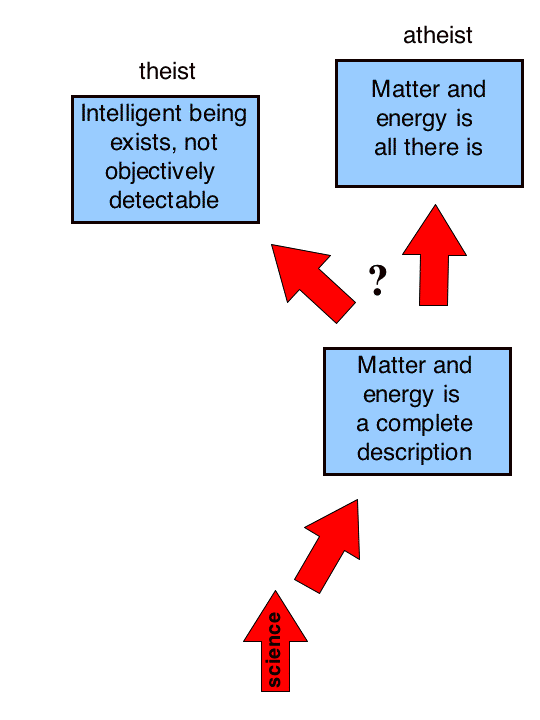
Notes on Paul Nelson's lecture at the "Design and its Critics" Conference, Concordia University, June 22-24, 2000
Two views about why this subject is controversial in our society:
A. religious people, largely ignorant of science, violate scientific integrity to impose their beliefs.B. atheists violate the integrity of science to impose naturalistic ideology
